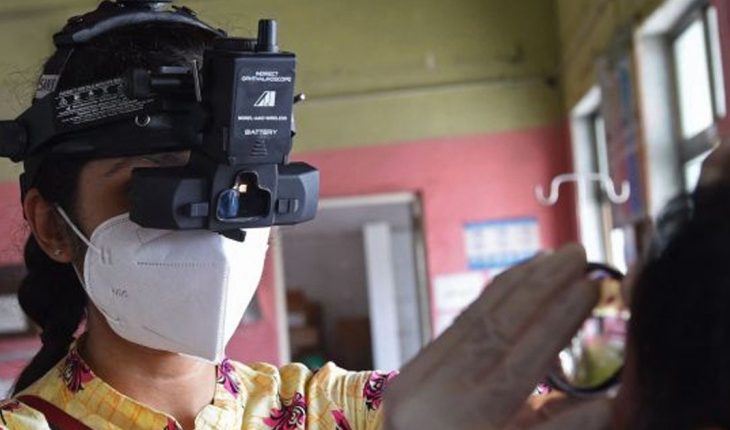India, in a serious health crisis over the coronavirus pandemic, has a new problem ahead of it. In recent days, the country recorded an increase in cases of murcomicosis, a strange and life-threatening infection popularly known as “black fungus.” According to official reports, the disease has been detected in 8,848 people, most of them patients recovered from Covid-19 or still transiting the virus. In view of this rapid increase, the central government is sending the drug amphotericin B to all affected states, announced the Minister of Chemicals and Fertilizers, Sadanand Gowda, on his Twitter account.
Murcomicosis infections, whose mortality is around 50%, are mainly concentrated in the western states of Gujarat and Maharastra, where 2,281 and 2,000 fungus infections have been diagnosed respectively. This is not a coincidence. It is that the coastal region of Maharastra, whose capital is Mumbai, has been hit hardest by the virulence of the second wave of coronavirus in the country. Although the rate of contagion remains declining, the number of infected remains around 4,000 cases per day. Indian health authorities reported a couple of weeks ago, when a significant increase in cases was detected, a report on the causes, diagnosis and treatment of mucormycosis, which although it may appear in coronavirus patients, is a pre-pandemic infection and is not directly related to Covid.In that line, the doctor specializing in infectious diseases Atul Patel told efE agency that this fungal infection mainly affects “patients with uncontrolled diabetes or who have some complications from diabetes.” It’s not something everyone can get,” the doctor said, adding that, in this sense, “a determining factor that is also contributing to increasing incidence is the use of steroids for the treatment of covid-19 infection.” Prevention measures include hygiene, the use of water cover and the protection of the whole body when gardening work is carried out. Black mushroom: what it is, how it contracts, its symptoms and how it is treated
The black fungus is caused by mold found in humid environments such as soil or compost, and can attack the airways. It is not contagious and is not transmitted from person to person. Several types of fungi can cause the disease. These fungi are not harmful to most people, but can cause serious infections among those with weakened immune systems, according to the U.S. Centers for Disease Control and Prevention (CDC).” Black fungi often affect the breasts or lungs after a person inhales fungal spores into the air, and can also affect the skin after a superficial injury such as a cut or burn. Symptoms depend on where the fungus grows, but may include facial swelling, fever, skin ulcers and black mouth injuries,” CNN says. The disease “begins to manifest as a skin infection in the air pockets behind the forehead, nose, cheekbones and between the eyes and teeth,” the Indian Ministry of Health said in a statement on May 14. “It then spreads to the eyes, lungs and can even spread to the brain. It causes blackness or discoloration on the nose, blurred or double vision, chest pain, shortness of breath and coughing up blood.” One of the ways mucormycosis travels is by invading blood vessels,” says Dr. Hemant Thacker, consultant physician and cardiometabolism specialist at Breach Candy Hospital in Mumbai. “It compromises circulation to the distal organ, and thus produces what is called necrosis or death of the tissue, which then turns black. That’s why it’s given the name black fungus,” he adds. Immunocompromised people are more susceptible to infection, such as patients with Covid-19, diabetics, people taking steroids, and those with other comorities, such as cancer or organ transplants, according to the Indian Ministry of Health.Coronavirus patients are especially susceptible because the virus not only affects their immune system, but treatment medications can also suppress their immune response. “Because of these factors, patients with Covid face a new risk of not being able to fight attacks from organisms such as mucormycetes,” explained the Ministry.intensive care units may have humidifiers in the room, which can increase their exposure to moisture and make them more prone to fungal infection, the Ministry detailed.” The fungus seizes the opportunity, invades the body,” Thacker said. “This body has a small opening because of covid, because of sugars (high glucose levels), because of antibiotics, because of so many other things, (the black fungus) gets a hole.” The Ministry warned that “this does not mean that all covid patients will be infected by mucormycosis”, as it is rare among those not having diabetes. The infection is treated with antifungal medications, often given intravenously. The most common drugs are amphotericin B, a drug currently being used in Indian states to combat the outbreak. Patients may need up to six weeks of antifungal medications to recover. Your recovery depends on how quickly the disease has been diagnosed and treated. Surgical intervention is often needed to cut dead or infected tissue. “In some patients, this can result in the loss of the upper jaw or sometimes even the eye,” the Indian Ministry of Health warned in its statement.





